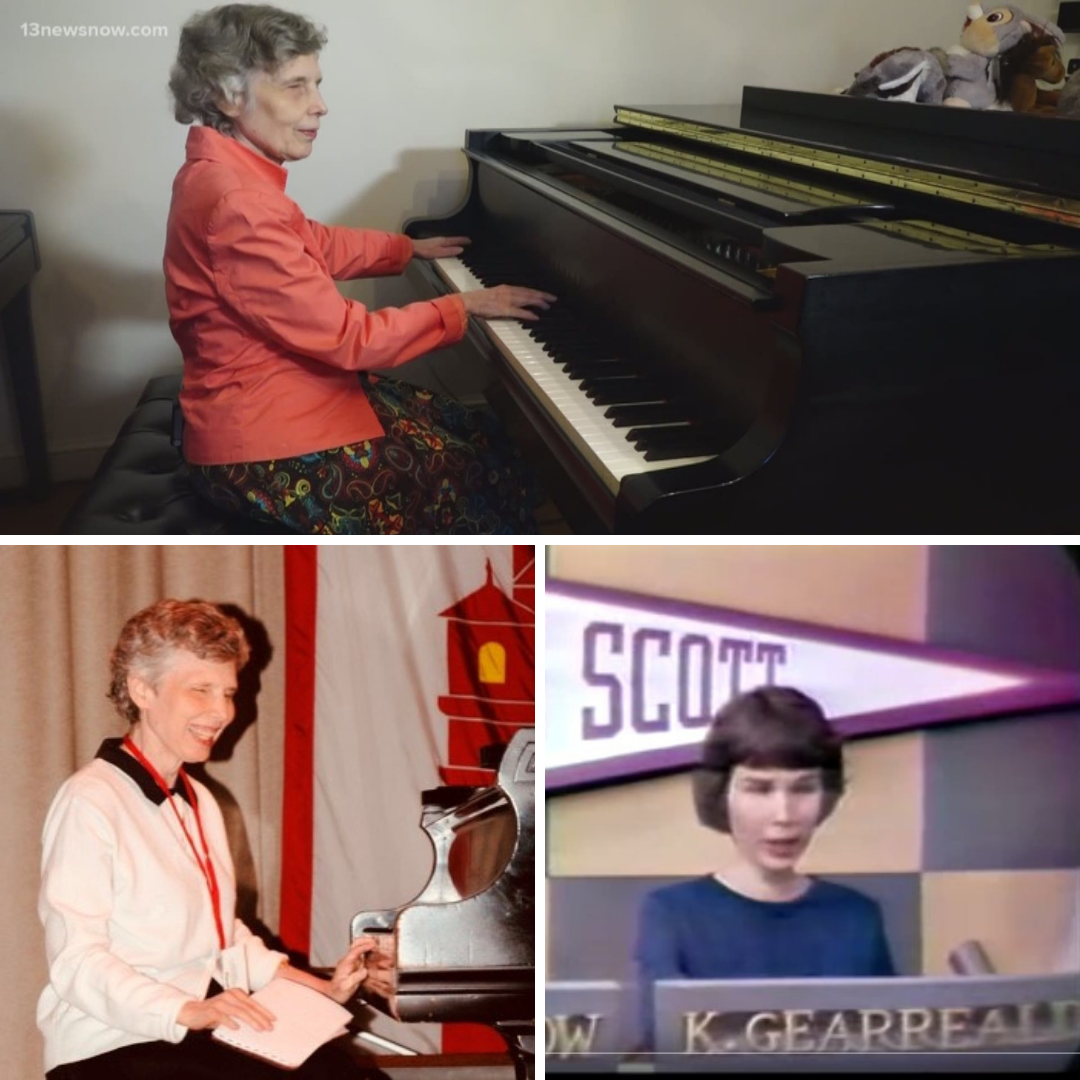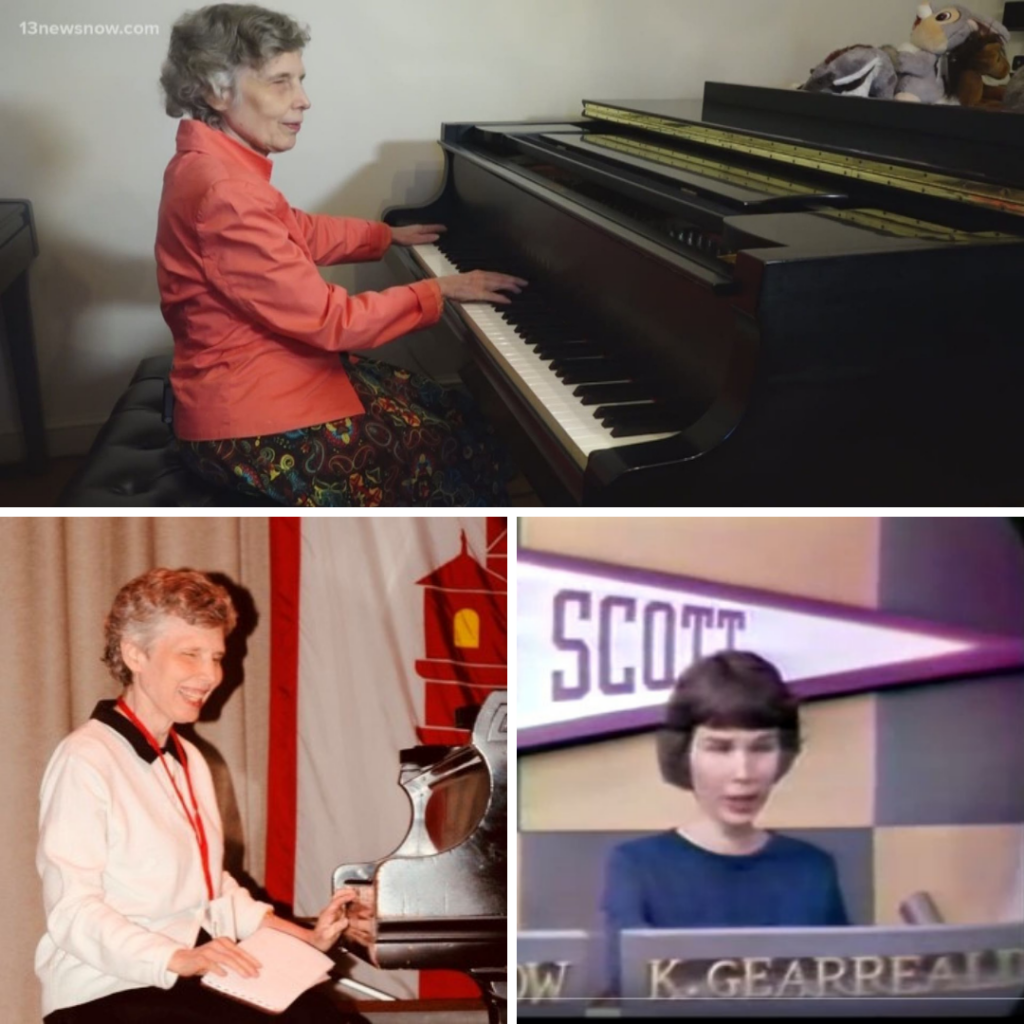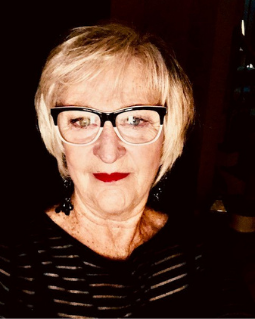


By Susan Hitchcock
Founder & Host Emerita of Women in Leadership
How many careers and accomplishments can one person have – especially if you’ve been blind since birth? I found extraordinary answers to this question in the person of Karen Gearreald of Norfolk, VA. Counting her latest career as an entrepreneur and another title as philanthropist, she’s had at least 10 careers and titles including educator, lawyer, actress, international speaker, administrator, pianist, singer, and Braille music advisor and translator for the Library of Congress!
Add to that these facts: Karen received her Ph.D. in English from Harvard and her law degree from Duke University School of Law. But that’s not all. She’s actually famous for her participation in what’s been called the “David and Goliath Battle of Brains.” It was the GE College Bowl, a popular televised competition which featured four female students from the small, liberal arts institution in Decatur, GA – Agnes Scott College – and four young male Ivy Leaguers from the venerable Princeton University. The video of this event became a classic and lives on as a YouTube hit, appealing to all generations. Seems everybody likes to watch the “girls and the guys” go head to head in the intelligence arena to see who’s the smartest.
Well, in this case, we know who hit the final buzzer and beat Princeton and it was none other than a diminutive but brilliant Agnes Scott senior named Karen Gearreald. Appropriately, she and her Scottie teammates were heralded as heroes of their day (although I prefer “SHEroes” and just plain “smart chicks”).
The early years
Born in New Jersey, Karen moved several times with her family of six: her father, mother, and three siblings (older sister and two younger brothers). When she was in the 5th grade, the family relocated to Norfolk which Karen considers “home” even though she’s also lived in Boston, Chicago and Durham during her professional life.
All of Karen’s family members were sighted, with no history of blindness, so the “why” for Karen is simply an unknown. Her parents were determined that she should become as independent as possible – and Karen didn’t disappoint them.
“I’d say my confidence developed early on,” Karen said. “I never felt isolated or alone, always felt supported and encouraged to take personal responsibility. At six years old, I started reading Braille, which I mastered in the second grade. I became somewhat of a pioneer in Virginia by attending public school all the way through high school. I’ve never had trouble learning and I continue to love it.”
As a teenager, Karen didn’t have much interest in a robust social life. She preferred church activities and she loved sports. “I really wish I could’ve played a sport,” she said, “and I still follow sports today, especially baseball and my team: the Yankees! I also like getting to know baseball broadcasters and I truly admire their work ethic and personality. I like talking to them as though they’re family, not expecting or trying to get anything.”
Two pieces of early life advice have stuck with Karen, the first from her father. “Life is a matter of selective neglect” (also known as prioritization). During walks they took together, her father would share his wisdom which Karen has utilized throughout her life’s journey. Another piece of advice came from one of her Latin teachers: “Keep a keen interest in people and things.” Clearly Karen took this to heart as well and made it a guiding principle both personally and professionally.
Curated career reflections
The Law: Given her Ph.D. in English and her four years teaching at the Hadley School in Chicago, it wasn’t completely clear what led Karen to law school and a subsequent 20+ year government career as a lawyer in the U.S. Navy civil service. “I had actually thought about it for some time because it’s a career path that provides independence for a blind professional. My reading and experience had told me that majoring in English and studying the liberal arts can open up various career paths. Those insights proved to be true.”
Her legal role in the Navy included researching comptroller decisions and procurement and there were definitely some limitations being blind. However, when computers came along, Karen’s capabilities were greatly enhanced. She was able to research cases, sometimes even before her sighted colleagues. At the same time, she never abandoned her interest in and commitment to music and singing.
Acting: The opportunity to try out for a particular role for a blind lead came about with the Ken Anderson film about Fanny Crosby, the blind lyricist who wrote many Christian hymns. Karen landed a supporting role rather than the lead, but she learned a lot about the profession. “Acting helped me improve my speaking skills; however, I wasn’t always impressed with how prepared some of the actors were. Let’s just say their work ethic and mine were different.”
Braille music advisor for the Library of Congress: “I fell into this opportunity and I’d say it was just what God planned. I was teaching Braille to incarcerated and non-incarcerated individuals when this came along. I became an instructor and advisor for the LOC’s Braille Music Transcription Certification program.” While learning music by ear is important, Karen explained that standard braille music is essential for blind musicians to perform and enjoy all types of music and to truly understand the composer’s nuances.
Entrepreneurship: “This is my most recent initiative and I’m very excited about the possibilities. I purchased scanners and embossers so that I could evaluate and print Braille music. I realized that if I owned this equipment, I could create a new line of work and new revenue stream from home. I had to have my home renovated to accommodate it but now I can create and translate all kinds of documents in various languages including English, German and Spanish. This certainly proved to be helpful during the pandemic.”
Defining times and “once-in-a-lifetime” events: The decision to attend Agnes Scott College for her undergraduate education played a major role in Karen’s life, one of a number of defining times. Her older sister attended there, but the most important thing to Karen was the academic rigor and the exceptional faculty. “I thought of it as a once-in-lifetime experience and my memories of my professors reflect that – memories of Dr. Hayes, Dr. Pepperdine, Dr. Calder and so many others. I enjoyed courses that were not even in my major field. I remember Professor Gaylord once gave me an A+ in integrated algebra and I didn’t think I deserved such a high grade. When I asked her about it, she replied, ‘It’s a measure of your progress.’ I have used that same principle with many of my own students.”
Not surprisingly, Karen graduated from Agnes Scott with the highest honors and she remembers Dr. Robb telling her that one of her many papers had been read by people all over the country and had changed lives. “That was very special,” she said. “What I also remember is that my classes seemed surprisingly easy, while the hard part was the preparation. Of course, there was no internet or technology then. Everything is quite different today.”
As already mentioned, Karen’s 1966 GE College Bowl experience is also a treasured memory and a defining moment in time. She credits her advanced French class with giving her the winning answer to the question, “What are Balmung and Durendal?” The answer: SWORDS.
Bucket list and other highlights
Travel: “I definitely want to go back to Latin America. I went there for a month in 1971 as a speaker with the Rotary Foundation. More recently, just three years ago, I went to Israel with Operation Blessing and that was a game changer. My work there supported much needed change. Knowing how well it worked out gives me confidence that I can make another trip to Central America even now.”
Performing: “You can add appearing in an opera to my bucket list, although I suspect my age is against me on this one. It would be fun though!”
What I’m most proud of: “My deep and continuing interest in learning. I’m also glad to be at a point in my life where I don’t have to prove anything to anybody.”
Regrets or disappointments: “Not being able to drive but fortunately I have friends who help me as needed. And for the record, I don’t plan to get a self-driving car because I don’t trust them and basically, it just doesn’t matter anymore.” Karen added: “I never married. I would have liked to have children but my relationships just didn’t work out in that way.”
Advice for a young person(s) with a disability: 1. “Be grateful for what is good.” 2. “Focus on what can work out well and what gifts you have that you can maximize in a given situation.” 3. “Build a support team other than your parents and adjust your expectations. Because if you lose your parents or primary support network, things won’t remain the same.” 4. “Don’t burn bridges” – good advice for anyone and something Karen learned early in her career.
Final takeaway
By the end of this interview, Karen Gearreald – the whole person, as well as the multifaceted high achiever – left the interviewer awestruck with her courage, character, and confidence. To truly appreciate who she is and what she’s accomplished you just have to understand her perspective. This quote gives you a clue: “The ability to see, although helpful at times, is a very small matter.”
SusanHitchcock@turknett.com
Susan Hitchcock Bio
770-270-1723




